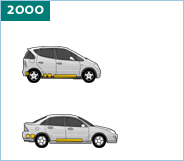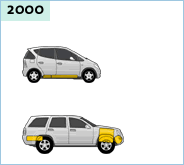 |
The prototype cars Ballard's customers have demonstrated --
powered by Ballard® fuel cell engines -- include
the following vehicles.
Hydrogen-fueled
|

|
 |
Mercedes Sprinter, Hydrogen, 75
kW
DaimlerChrysler unveiled the Mercedes-Benz
Sprinter powered by a Ballard® fuel cell
engine in August 2001. The delivery company Hermes
Versand Service is field-testing the hydrogen fuel cell
vehicle under everyday conditions for two years in
Hamburg, Germany. |
 |
|

|
 |
Necar 4 Advanced, Hydrogen, 75
kW
The Necar 4 Advanced, introduced in 2000,
is powered by a Ballard® fuel cell power
train and fueled by gaseous hydrogen. This is unlike the
Necar 4 which was introduced in 1999 and used liquid
hydrogen as the fuel.
Ford Focus FCV, Hydrogen, 75
kW
The Ford Focus FCV, powered by a
Ballard® fuel cell power train using hydrogen
as the fuel, was unveiled in 2000. |
 |
|

|
 |
P2000, Hydrogen, 70
kW
Ford's P2000, powered by a
Ballard® fuel cell power train, was
introduced at the North American International Auto Show
in January 1999. |
 |
|

|
 |
Necar 4, Hydrogen, 70 kW
The
Necar 4, based on the DaimlerChrysler A-class and
powered by a Ballard® fuel cell power train,
was unveiled by DaimlerChrysler in 1999. Using liquid
hydrogen as the fuel, this revolutionary car emits only
water vapor. |
 |
|

|
 |
Necar 2, Hydrogen, 50
kW
DaimlerChrysler's Necar 2, using
Ballard® fuel cells, was unveiled in 1996.
Capable of carrying six passengers, the
Ballard® fuel cell in this vehicle was small
enough to fit under the back seat of the
automobile. |
 |
|

|
 |
Necar 1, Hydrogen, 50
kW
While the DaimlerChrysler Necar 1 fuel cell
vehicle, powered by Ballard® fuel cells,
presented in 1994 was a "laboratory on wheels" packed
full to the brim with technology, it succeeded in
demonstrating the basic feasibility of fuel cells on
board a passenger vehicle. |
Methanol-fueled
|

|
 |
Mazda Premacy FC-EV, Methanol, 75
kW
In 2001, Mazda introduced the Premacy
FC-EV, powered by a Ballard® fuel cell power
train using methanol as the fuel. The Premacy is
currently being road-tested in Japan. |
 |
|

|
 |
Necar 5, Methanol, 75
kW
DaimlerChrysler unveiled the Necar 5
prototype automobile in Berlin, Germany in November
2000. The Necar 5 utilizes methanol as a fuel with an
advanced Ballard™ fuel processor and system developed to
supply hydrogen to a Ballard® fuel cell power
train.
Jeep Commander 2, Methanol, 75
kW
In October 2000, DaimlerChrysler unveiled
the Jeep Commander 2, a luxury class fuel cell Sport
Utility Vehicle (SUV), powered by a Ballard®
fuel cell engine using an on-board methanol reformer. A
nickel-metal hydride battery provides supplemental
energy and captures energy normally lost during
braking. |
 |
|

|
 |
Necar 3, Methanol, 50 kW
The
Necar 3, a DaimlerChrysler A-class subcompact, powered
by Ballard® fuel cells, was introduced at the
Frankfurt Auto Show in 1997. This was the first fuel
cell passenger car to use methanol as the fuel,
converting liquid methanol fuel on board into hydrogen
through water-vapor reformation. |
In addition, the following fuel cell passenger vehicles [6 KB] using
Ballard® fuel cells have been shown publicly.
You must have Acrobat Reader 4.0 or higher installed on
your computer to view PDFs. Click on the icon below to
download a free copy of the Acrobat Reader.

|